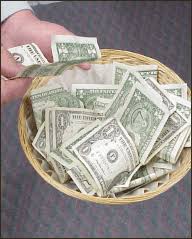|

Tithing Rewards Both
Spiritual and Financial
By Avis Thomas-Lester:
Washington Post
Staff Writer:
Saturday, April 15, 2006; Page A01
LaVonne and Bernard Snowden have three children in private school, two
flourishing careers and an elegant house in Mitchellville. As thanks for
those blessings, the Snowdens say, they give 10 percent of everything they
make to their church.
Carla Brooks, a Howard University graduate student, doesn't bring in much
except her financial aid and what she earns working part time. Even so, she
puts 10 percent of her money in an envelope marked "tithes."
The Rev. Bucas Sterling, pastor of Kettering Baptist Church, says he has
seen "an increase in what is called 'prosperity ministry,' the approach that
says the intention of God is for all of his children to be financially well
off." (Photos By Marvin Joseph -- The Washington Post)
Tithing, or giving the church a percentage of income, has experienced a
revival in Prince George's County. Percent of income after taxes dedicated
to charitable giving in the region:
"Anything that I get, I tithe," Brooks said. "It's not a hardship at all.
It's like when anyone else gets their check. They see what they have, they
pay their bills and live on what is left. I tithe, and I live off the rest."
Tithing, an ancient practice described in the Bible, is particularly strong
in African American communities, where it is reinforced by centuries of
family tradition. That has helped propel Prince George's into the top five
counties in the nation for charitable giving, as documented by a Chronicle
of Philanthropy study based on donations as a percentage of income.
A Washington Post analysis using the same data found that 14 of the top 20
Zip codes for per capita giving in the region were in Prince George's.
Across the spectrum of faiths, religious institutions draw much of the
nation's charitable money, accounting for three out of every four dollars
given, the chronicle's study of 2002 IRS data found. In African American
communities, the figure is closer to nine out of every 10 dollars.
In Prince George's, tithing has played a major role in supporting churches
-- helping provide the capital, for example, to develop the 73.8-acre campus
of Jericho City of Praise, a megachurch in Landover, and pay off its
mortgage in seven years.
When the Rev. Jonathan Weaver arrived at Greater Mount Nebo African
Methodist Episcopal Church 18 years ago, his congregation had 65 members,
and fewer than 1 percent tithed. Today, the congregation in Bowie has grown
to more than 2,000 members; they worship in a $4.6 million sanctuary; and
more than 75 percent tithe, Weaver said.
"Some people have a sense that pastors are heavy-handed . . . in the use of
the Scripture to insist that people tithe," he said. "But we are not
encouraging people to give 10 percent. We want them to be effective managers
of the other 90 percent. God wants us to be effective managers of what He
has entrusted us with."
At some churches, tithing is the backbone of a movement known as "prosperity
ministry," through which churchgoers are encouraged to give under the belief
that they could receive riches in return. The Rev. C. Matthew Hudson Jr.,
pastor at Matthews Memorial Baptist Church in Southeast Washington, has been
delivering a 12-week series of sermons encouraging churchgoers to put in not
just the traditional 10 percent but even more to support their church.
"God is a promise keeper," he said in an interview. "He says if you give
[to] me, try me and see if I won't open a window from heaven and pour you
out a blessing. I'm going to bless your health, family finances and future."
Tithing first appears in the book of Genesis -- Abraham gave "a tenth" to
Melchizedek, king of Salem -- and is sprinkled throughout the Old Testament.
In modern times, the practice is open to many interpretations. Should a
family give 10 percent of all its income, or of just one salary? Before or
after taxes? To the local church or broader ministries?
Many churches of various denominations emphasize gifts of "time, talent and
treasure," allowing some members to meet their biblical obligation with
volunteer hours or other services.
One of the five pillars of Islam is zakat , which calls for contributing 2.5
percent of income. In the Jewish faith, the tradition of tzedakah focuses on
"giving to be just or right" and not on meeting a specific goal for giving,
said Rabbi Fred Reiner of Temple Sinai in Northwest Washington.
The Rev. Bucas Sterling, pastor of Kettering Baptist Church, says he has
seen "an increase in what is called 'prosperity ministry,' the approach that
says the intention of God is for all of his children to be financially well
off." (Photos By Marvin Joseph -- The Washington Post)
Tithing, or giving the church a percentage of income, has experienced a
revival in Prince George's County. Percent of income after taxes dedicated
to charitable giving in the region:
Kenneth Page, stake president of the Church of Jesus Christ of Latter-day
Saints churches in the District and Southern Maryland, said Mormons must
tithe 10 percent of their "increase." The church lets individuals decide
whether to tithe gross or net income.
Of the 4,500 members in the 12 churches that Page's stake includes, about 50
percent tithe at least 10 percent and an additional 25 percent give
something above a regular offering. Page said tithing is considered a
commandment just as much as not stealing and not lying are.
|

Many African American ministers believe the custom is so strong among their
congregations because of the historic role of the church in social and
political activism and because of generations of family tradition.
"People have grown up in the church, and they trust the church, and that
goes a long way in terms of fundraising," said Rodney Jackson, president of
the National Center for Black Philanthropy in the District.
Long before government programs were put in place to help the poor and the
needy, black churches were responsible for assisting their congregations
with everything from food and shelter during Reconstruction to legal help
during the civil rights movement.
Money dropped into the offering plate wasn't just for the building fund.
Black churches paid to help poor and disenfranchised citizens at a time when
no other help was available, experts said.
The Rev. Granger Browning of Ebenezer A.M.E. Church in Fort Washington said
about 70 percent of his 15,000 members tithe, in part because they can see
the good work the church is doing for the homeless, poor and addicted in the
community.
"If you can convince them of a need, persons are very generous -- even those
who are not wealthy," Browning said. "Especially older persons, senior
citizens. They will always give to churches, and that has helped as the
churches have been called to give as the government cuts back on some
services."
But that view of tithing -- as biblical obligation and community service --
has given way in some churches to an emphasis on giving under the belief
that the members will prosper financially in return.
"What we are seeing is more giving, but I wouldn't attribute it only to
people adhering to the principle of tithing," said the Rev. Bucas Sterling,
pastor of Kettering Baptist Church in Upper Marlboro. "There is also an
increase in what is called 'prosperity ministry,' the approach that says the
intention of God is for all of his children to be financially well off.
Materialism is being promoted, in a way. The whole idea is that God wants
them to have money."
"The hook that this ministry is promoting is that you must give a lot to
receive a lot. You put money in, you get money out. Almost like an
investment, whereas the principle of tithing is that you should give to be
obedient to God."
Such an emphasis on individual enrichment and empowerment, as described by
Dallas minister T.D. Jakes, has allowed the church to abandon its emphasis
on community and political advocacy, some ministers say. Others worry that
the perception of clergy growing rich on the proceeds of their ministry
could alienate churchgoers.
The Rev. Bucas Sterling, pastor of Kettering Baptist Church, says he has
seen "an increase in what is called 'prosperity ministry,' the approach that
says the intention of God is for all of his children to be financially well
off." (Photos By Marvin Joseph -- The Washington Post)
Tithing, or giving the church a percentage of income, has experienced a
revival in Prince George's County.
Hudson said prosperity ministry has been painted with a negative brush
because some people associate it with greed. Instead, he cited such Bible
verses as Deuteronomy 28: 1-4, which promise that those who obey God will be
made rich and prosperous.
Hudson said about 40 percent of the 900 members of Matthews Memorial tithe,
but his goal is for 100 percent of the churchgoers to contribute at least 12
percent of their income -- what he called "sacrificial giving."
"Tithing is about giving in obedience, so you don't get any kudos for that.
It's what you are supposed to do as a Christian," he said. "When we talk
about sacrificial giving, that is about giving towards our vision, our dream
as a church."
That dream includes a school and community development corporation funded
with donations from churchgoers.
Deloris Walker of Southeast Washington gives her 10 percent at Hudson's
church.
Walker, a Department of Agriculture secretary, said tithing proved a
hardship initially, but she was determined to make the sacrifice.
"I never made enough money to tithe, but my blessings became more abundant
when I started," she said. "Things just seemed to happen in a positive way.
Since I started tithing, my financial situation is much better, and I have
been blessed even more."
Her daughter, Carla Brooks, said she enjoys tithing at the Soul Factory
church in Forestville because her pastor, Derron Cloud, runs a
service-oriented ministry. Among the Soul Factory's recent projects was
collecting three truckloads of provisions for Hurricane Katrina victims and
traveling to the storm-ravaged area to assist people in need.
LaVonne Snowden, an account executive for an office furniture dealer in
Largo, said she appreciates tithing for the way it makes her feel.
For a while, she had stopped giving regularly. Now, she and husband Bernard,
a Prince George's police lieutenant, both give 10 percent. So do their
children, who put a weekly donation into the offering plate at Kettering
Baptist Church.
"When I started up again, I noticed how good I felt about myself," she said.
"I sat up higher in the pew because I felt that I was being really obedient
to God. Inside, it made me feel proud of myself. . . . It wasn't about
giving something to get something. It was about doing what I am supposed to
do."
Staff writer Hamil R. Harris and staff researcher Derek Willis contributed
to this report.
|





